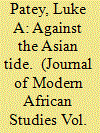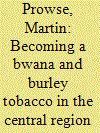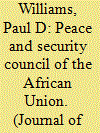| Srl | Item |
| 1 |
ID:
092173


|
|
|
|
|
| Publication |
2009.
|
| Summary/Abstract |
The efforts of American activists to pressure Asian corporations in Sudan have to date resembled a struggle to find the light switch in the dark, or swimming against a strong current. While the impact of the divestment campaign in the United States has been increasingly evident, its effectiveness in producing actual results in Sudan remains suspect. Thanks to China and a trio of Asian national oil companies, oil still flows in Sudan. The campaign's activities have failed to incorporate Sudan's wider international political and economic relations into its strategy. It has rather paradoxically sought to pressure state-owned corporations through financial market divestment. The nature of its Asian targets, reluctant Western investors and a distracted American government have obstructed the campaign from having a resounding impact in Sudan.
|
|
|
|
|
|
|
|
|
|
|
|
|
|
|
|
| 2 |
ID:
092174


|
|
|
|
|
| Publication |
2009.
|
| Summary/Abstract |
Smallholders now grow most of Malawi's main export crop - burley tobacco. Based on nineteen months' fieldwork in the Central Region, this article offers a sociological interpretation of why some smallholder growers spend a proportion of burley income on conspicuous consumption in rural towns and trading centres. This practice can be seen as a form of inculcated behaviour whereby smallholders reproduce elements of one model of success in this region: that of the Malawian tobacco bwana (boss/master). The article discusses implications from this form of potlatch behaviour by describing the contrasting fortunes of two non-farm rural enterprises, examining data on how tobacco production and 'cooling off' is viewed by wives, and comparing the crop preferences of husbands and wives. It concludes by suggesting that the concept of conspicuous consumption may provide an alternative prism to the instrumental lens of neo-patrimonialism through which to view apparently unintelligible investment decisions in African economies.
|
|
|
|
|
|
|
|
|
|
|
|
|
|
|
|
| 3 |
ID:
092171


|
|
|
|
|
| Publication |
2009.
|
| Summary/Abstract |
The modernised tradition of the Gacaca courts has become the key mechanism for dealing with the past in Rwanda. The process needs to establish accountability for all acts of genocide and to foster reconciliation. Nevertheless, popular narratives and survey results reveal that a widespread 'crisis' accompanied the initial stages of the Gacaca process. We argue that a problematic quest for the truth is short-circuiting reconciliation in post-genocide Rwanda. Truth-telling is the cornerstone of the transitional justice framework due to the design of the Gacaca tribunals. On the basis of twenty months of fieldwork in Rwandan villages, we locate tensions at different levels. The Gacaca system is a distinctively modern phenomenon despite its traditional appearance. The state-sanctioned speaking of the truth according to a prosecutorial logic runs counter to the core values of the customary institution and established societal practices. This friction is further enhanced by the underlying Judeo-Christian model of truth-telling introduced with the Gacaca system in a socio-political environment mediated by a culture of deceit and dominated by a war victor. In such a socio-cultural context, communication serves the interests of the power holders (national and local), and not necessarily the interest of truth-telling and justice.
|
|
|
|
|
|
|
|
|
|
|
|
|
|
|
|
| 4 |
ID:
092170


|
|
|
|
|
| Publication |
2009.
|
| Summary/Abstract |
The 2004 reform of the family code in Morocco has been held as one of the most significant liberal reforms undertaken in the country, and has led scholars and policy makers to argue that this demonstrates the democratic progress Morocco and the King are making. At the same time, the role of the women's movement in getting the reform approved has seemingly confirmed that associational life is crucial in promoting democratisation. This paper, building on theoretical work questioning the linkage between a strong civil society and democratic outcomes, argues that civil society activism does not necessarily lead to democratisation, and may reinforce authoritarian practices. Far from demonstrating the centrality of civil society, the process through which the new family code was passed highlights the crucial institutional role of the monarch, whose individual decision-making power has driven the whole process. Authoritarianism finds itself strengthened in Morocco despite the liberal nature and outcome of the reform.
|
|
|
|
|
|
|
|
|
|
|
|
|
|
|
|
| 5 |
ID:
092175


|
|
|
|
|
| Publication |
2009.
|
| Summary/Abstract |
How has the Peace and Security Council (PSC) of the African Union helped promote peace, security and stability on the African continent? This article assesses the PSC's activities in light of insights generated by the literature on international security institutions. After providing an overview of the immediate origins of the PSC, it discusses five elements of the Council's institutional design. It then evaluates the PSC's activities during its first five years (2004-9), by examining the Council's political relevance, its efficiency and productivity, and whether it is the institution best placed to deal with the continent's security problems. It concludes that the PSC's future will hinge on whether more of the African Union's members can be persuaded to devote more serious levels of resources (human and financial) to it.
|
|
|
|
|
|
|
|
|
|
|
|
|
|
|
|
| 6 |
ID:
092172


|
|
|
|
|
| Publication |
2009.
|
| Summary/Abstract |
This article examines the institutional politics of law enforcement in Nigeria by focusing on illegal drug control since the mid 1980s. It assesses the available academic research on law enforcement governance, and contrasts it with an in-depth case study of drug law enforcement. The case study confirms views of the politicised nature of law enforcement. However, it goes beyond the patron-client centred approach to politics prevalent in the literature on African policing. The article adds an institutional dimension to the study of law enforcement governance, highlighting processes of centralisation, exclusion and shifting bureaucratic interests that have been central to the development of Nigerian drug law enforcement. It is based on previously inaccessible data from inside Nigerian drug law enforcement.
|
|
|
|
|
|
|
|
|
|
|
|
|
|
|
|